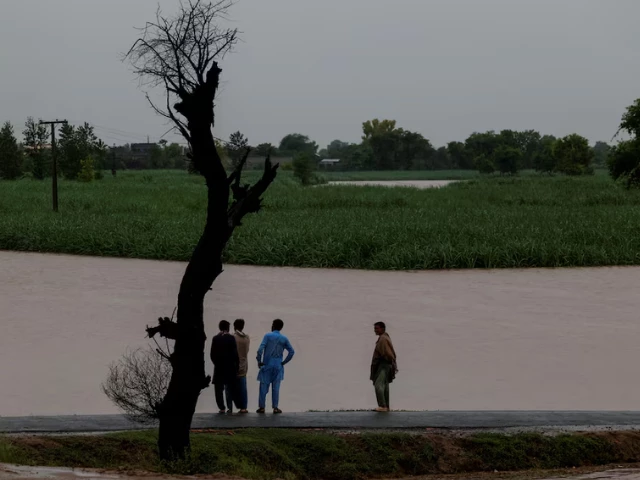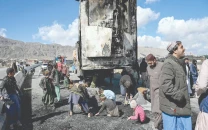Punjab rivers return to normal as monsoon ends: DG PDMA
Floods damage 2.58 m acres farmland, Gujrat and Faisalabad suffer worst losses

Punjab’s monsoon season has ended and river flows have returned to normal, Director General Provincial Disaster Management Authority (PDMA) Irfan Ali Kathia said on Friday, while outlining the province’s flood damage and relief operations.
At a press conference, Kathia confirmed all rivers are now at normal levels. The Chenab shows no peak from Marala to Panjnad and water has receded from Jassar to Sadhnai, though the Sutlej continues to carry a slightly higher flow.
He reported that 22 kilometres of the Multan–Sukkur Motorway (M-5) remain closed due to flooding, with 10–12 kilometres still underwater, but repair work is underway. The Jalalpur–Lodhran road also remains shut.
Breach points at Rawaj Bridge, Sadhnai and Multan are being filled as the Chenab’s level falls.
Read: Multan–Sukkur M-5 motorway closed due to flooding
DG PDMA said 4,795 villages in 28 districts were affected, impacting 407,030 people. More than 612,800 residents and two million animals were evacuated.
Across South Punjab, 331 relief camps are housing about 106,000 people, supported by 425 medical camps and mobile clinics.
The floods have so far caused 123 deaths and damaged 2.58 million acres of farmland, with Gujrat and Faisalabad suffering the worst crop losses.
Maize was heavily hit, rice lost 15 per cent of its yield, sugarcane 13 per cent and cotton 5 per cent. Reports indicate 824 animals remain missing, pending survey verification.
A damage assessment survey covering crops, livestock and human losses will begin on September 24 under the direction of the Chief Minister of Punjab.
In Jalalpur Pirwala, floodwaters have receded by two feet in Nooraja Bhutta, Chak 87-M, Basti Sawa, the motorway interchange, Basti Lang and Bahadurpur, but an “8 to 10-foot flood still exists, keeping the situation critical,” local officials said.
Read More: Flood crisis, fiscal rethink
Federal Minister for Communications Abdul Aleem Khan visited Multan, meeting MNA and Kashmir Committee Chairman Rana Qasim Noon. “The flood has caused severe damage to farmers’ crops. Permanent and long-term planning is needed.”
He said, urging departments to “fulfil their responsibilities in time”. Both leaders expressed grief over the loss of lives and livelihoods and praised the National Highway Authority’s repair work.
Flood levels at Sindh’s barrages are improving, with Sukkur recording inflows of 399,000 cusecs, Guddu 426,000 and Kotri 315,000.
Sukkur and Guddu remain at medium flood level, while Kotri is at a low flood stage, according to the Sukkur Barrage control room.
Officials added that a low-level flood on the Sutlej continues to destroy homes. “Hundreds of houses have been flattened and thousands displaced.
Entire belongings were washed away,” a local update confirmed. A special technical committee is monitoring conditions for immediate response.
Rescue efforts
Relief operations remain underway. According to the National Disaster Management Authority (NDMA), “close to three million people have been rescued nationwide since June, with Punjab accounting for the bulk.” More than 150,000 remain in camps and 620,000 have received medical treatment.
Punjab Chief Minister Maryam Nawaz directed departments concerned to create an “efficient mechanism” for compensation.
Chairing a meeting in Lahore, she ordered authorities to “proactively reach affected communities” and assured that “every individual will be compensated after assessment of losses.”
The meeting decided to launch a rehabilitation operation and form committees at district and tehsil levels. A new survey form, mobile application and monitoring dashboard will also be introduced to ensure transparent payouts.
The CM Punjab further directed immediate work on restoring roads, bridges and other critical infrastructure in flood-hit areas.
Separately, Provincial Senior Minister Marriyum Aurangzeb praised frontline workers. “Suthra Punjab, Civil Defence, C&W, Forest and Wildlife staff performed their duties with great spirit during the floods,” she said.
Also Read: Flood levels drop in Sindh, Punjab as relief work continues
She conveyed a special message of “appreciation and shabash” to all flood workers. “We are all part of the CM’s team. Saving one life is a noble deed; saving hundreds or thousands—only Allah knows the reward.”
She noted that cleanliness drives during floods had helped prevent outbreaks of disease. “Workers who laboured with sincerity will be rewarded,” Aurangzeb assured.




















COMMENTS
Comments are moderated and generally will be posted if they are on-topic and not abusive.
For more information, please see our Comments FAQ